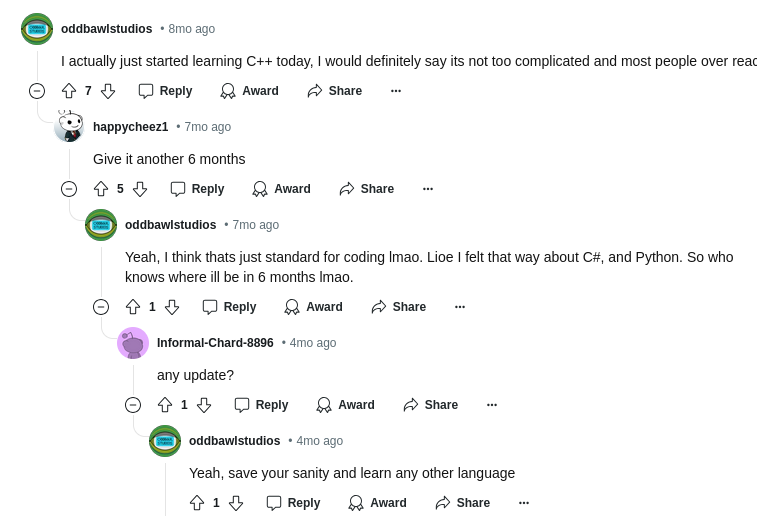this post was submitted on 02 Sep 2024
892 points (99.1% liked)
Programmer Humor
38418 readers
187 users here now
Post funny things about programming here! (Or just rant about your favourite programming language.)
Rules:
- Posts must be relevant to programming, programmers, or computer science.
- No NSFW content.
- Jokes must be in good taste. No hate speech, bigotry, etc.
founded 6 years ago
MODERATORS
you are viewing a single comment's thread
view the rest of the comments
view the rest of the comments


Jokes aside, I struggle more with abominations like JavaScript and even Python.
Do you have a minute for our lord and savoir TypeScript?
As long as it can distinguish between int and uint - yesss!
TypeScript is still built on JavaScript, all numbers are IEEE-754 doubles 🙃
Edit: Actually I lied, there are BigInts which are arbitrarily precise integers but I don't think there's a way to make them unsigned. There also might be a byte-array object that stores uint8 values but I'm not completely sure if I'm remembering that correctly.
Not only is there a UInt8Array, there's also a bunch of others: https://developer.mozilla.org/en-US/docs/Web/JavaScript/Reference/Global_Objects/TypedArray#typedarray_objects
Python has its quirks, but it’s much much cleaner than js or c++, not fair to drag it down with them imo
I think the thing with C++ is they have tried to maintain backward compatibility from Day 1. You can take a C++ program from the 80s (or heck, even a straight up C program), and there's a good chance it will compile as-is, which is rather astonishing considering modern C++ feels like a different language.
But I think this is what leads to a lot of the complexity as it stands? By contrast, I started Python in the Python 2 era, and when they switched to 3, I was like "Wow, did they just break hello world?" It's a different philosophy and has its trade-offs. By reinventing itself, it can get rid of the legacy cruft that never worked well or required hacky workarounds, but old code will not simply run under the new interpreter. You have to hope your migration tools are up to the task.
C++ is not a superset of C.
There were breaking changes between C and C++ (and some divergent evolution since the initial split) as well as breaking changes between different releases of C++ itself. I am not saying these never happened, but the powers that be controlling the standard have worked hard to minimize these for better or worse.
If I took one of my earliest ANSI C programs from the 80s and ran it through a C++23 compiler, I would probably need to remove a bunch of
registerstatements and maybe check if an assumption of 16-bitintis going to land me in some trouble, but otherwise, I think it would build as long as it's not linking in any 3rd party libraries.The terse indexing and index manipulation gets a bit Perl-ish and write-only to me. But other than that I agree.
Do you not use indentation in other languages?
Absolutely not, python is an actual programming language with sane error handling and arbitrarily nestable data structures.
Don't be so superficial. When learning something, go with the flow and try to work with the design choices, not against them.
Python simply writes a bit differently: you do e.g. more function definitions and list comprehensions.